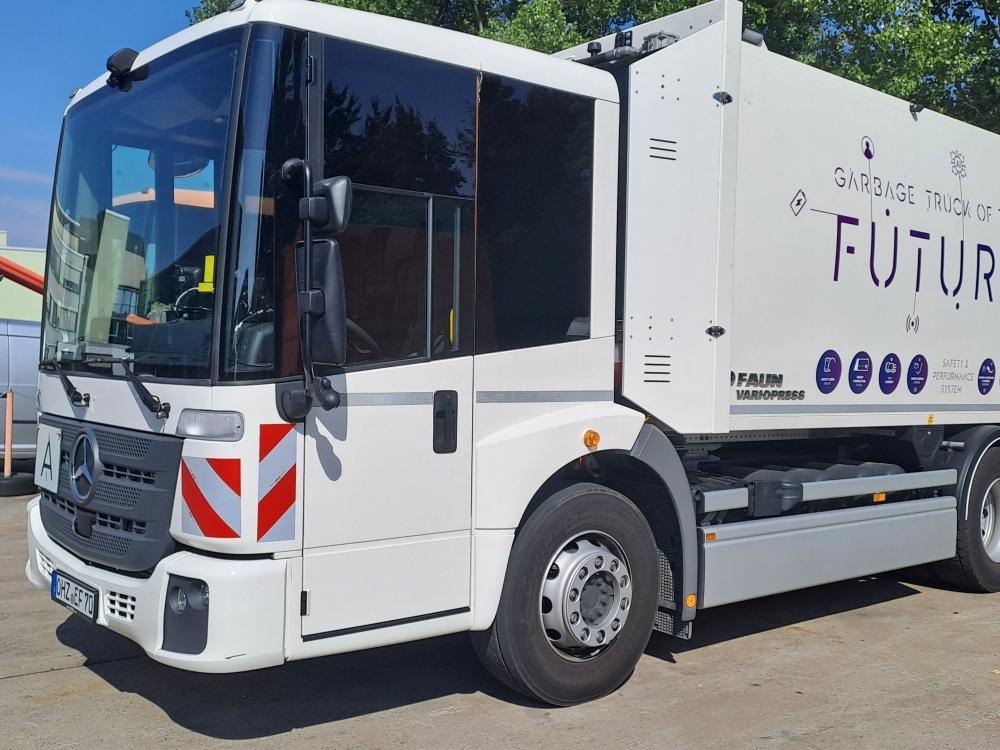
Kommunalservice Jena (KSJ) tested the all-electric Mercedes-Benz eEconic in regular waste disposal operations from August 20 to 27, 2025. The vehicle was used to collect lightweight packaging waste (yellow garbage can) and Paper, cardboard, cartons (blue garbage can). Several teams of refuse collectors took the opportunity to test the vehicle in the city under real conditions. The waste collection vehicle was charged using a stationary rapid charger (direct current) supplied with the vehicle.
The waste collection vehicle has a permissible total weight of 27 tons and is powered by an electric drive axle with two integrated electric motors and a two-speed gearbox. Three battery packs, each with an installed capacity of 112 kWh (336 kWh in total), provide a usable capacity of around 97 kWh per module. This results in a range of up to 150-200 kilometers depending on the application profile. The two liquid-cooled motors generate a continuous output of 330 kW and a peak output of 400 kW. Another advantage in collective transport is energy recovery through recuperation, especially in stop-and-go operation.
Goal: Electrification of the KSJ vehicle fleet
With this test deployment, the KSJ is sending out another signal of its efforts to gradually electrify its fleet of around 340 vehicles. Around 20 electric vehicles - including five electric vans - are already in use in areas such as tree care, playground maintenance, green space maintenance and city cleaning. The conversion of further large vehicles is planned from 2026/2027.
Investment in further expansion of the charging infrastructure
At the same time, the KSJ is building the necessary charging infrastructure: A transformer station is currently being built at Löbstedter Straße 68, which is expected to go into operation in the first quarter of 2026. This will be followed by the expansion of the power grid and intelligent charging systems with load management. This will be supplemented by photovoltaic systems on suitable KSJ roofs, which will supply additional electricity to power the e-vehicles in future.
Practical test passed
The first impression of the vehicle was consistently positive. The fast acceleration and direct response were particularly impressive in daily use. The tours were completed efficiently. The technical equipment was also praised: in addition to modern assistance systems, details such as grip heating and better illumination of the work areas provided additional working comfort.
After the tours, the vehicle still had 40 and sometimes 50 percent remaining battery capacity, which was reliably charged to 100 percent overnight. This showed that the vehicle offers a stable range in urban use. For a more comprehensive evaluation, the refuse collectors recommend a further test in the residual waste sector, particularly in winter conditions. The refuse collectors also reported a more pleasant working environment overall: operation without exhaust fumes, engine heat and noise contributed to a noticeably better working atmosphere. However, there were also challenges - the vehicle body sometimes proved to be too long for narrow streets in Jena, and the separate operation of the chassis was not perceived as optimal. Overall, however, the vehicle left a thoroughly positive impression.
With the vehicle test, the KSJ underlines that it is consistently working towards sustainable, emission-free urban cleanliness - while always keeping an eye on the practicality of new technologies.
 Deutsch
Deutsch English
English